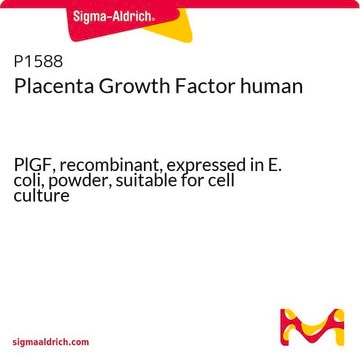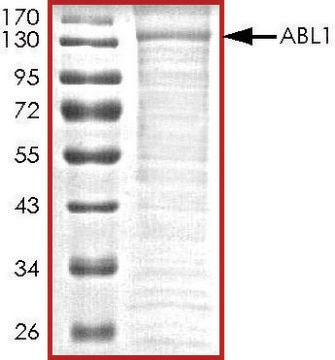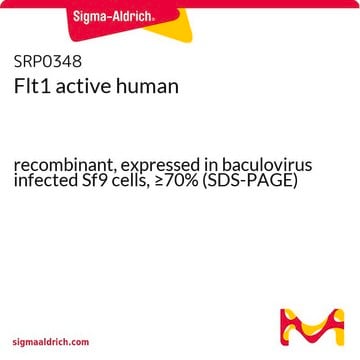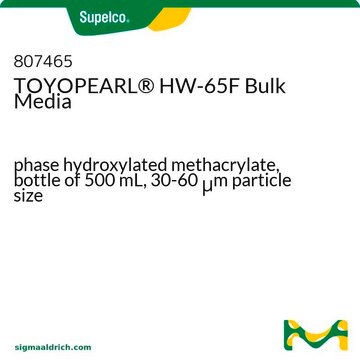PF082
VEGFR1, Human, Recombinant, S. frugiperda
Sinónimos:
Vascular Endothelial Growth Factor Receptor-1, Flt-1, EMRK2
Iniciar sesiónpara Ver la Fijación de precios por contrato y de la organización
About This Item
UNSPSC Code:
12352202
NACRES:
NA.77
Productos recomendados
assay
≥90% (SDS-PAGE)
Quality Level
form
lyophilized
manufacturer/tradename
Calbiochem®
storage condition
OK to freeze
impurities
≤1 EU/μg Endotoxin (EU/μg cytokine)
shipped in
wet ice
storage temp.
−20°C
General description
Recombinant, human VEGFR-1 expressed in S. frugiperda insect cells. Plays an important role in angiogenesis. Upon binding to VEGF, the receptor undergoes dimerization and is activated, leading to downstream signaling.
Recombinant, human VEGFR-1 expressed in S. frugiperda insect cells. The disulfide linked dimeric recombinant protein contains two polypeptides of 905 amino acids long with a predicted monomeric molecular mass of ~100 kDa. As a result of glycosylation, the monomer migrates as a ~123 kDa protein in SDS-PAGE. Vascular endothelial growth factor (VEGF), also known as vascular permeability factor (VPF), is a secreted heparin binding cytokine expressed in tumor and animal cells. VEGF has been implicated in the control of angiogenesis due to its selective mitogenic stimulation of vascular endothelial cells and enhancement of vascular permeability. VEGF is a ~34-50 kDa dimer of two identical disulfide-linked subunits existing in four molecular species; 121, 165, 189, and 206 amino acid residues long, arising from alternative splicing of a single gene. VEGF binds to two receptor tyrosine kinases, Flt-1 (VEGFR1) and KDR/Flk-1 (VEGFR2) found almost exclusively on human endothelial cells. Flt-1 binds VEGF and a new VEGF-related ligand, placenta growth factor (PIGF) but KDR/Flk-1 binds only VEGF. The cDNA encoding the soluble truncated form of Flt-1 cloned from a human endothelial cell library encodes the 6 N-terminal IgG-like extracellular ligand-binding domain but does not encode the transmembrane spanning region and intracellular tyrosine kinase domains. The recombinant soluble receptor binds avidly to VEGF and is a potent VEGF antagonist. Recently, a third VEGF receptor was identified and cloned from tumor cells. This VEGF receptor is isoform-specific, binding VEGF165 but not VEGF121. Studies indicate that this VEGF receptor (VEGF165R) is identical to human neuropilin-1, a receptor for the collapsin/semaphorin family that mediates neuronal cell guidance.
Biochem/physiol Actions
EC₅₀ of 15-30 ng/ml in a cell proliferation assay using human umbilical vein endothelial cells
Warning
Toxicity: Standard Handling (A)
Physical form
Lyophilized from sterile-filtered PBS, 300 mM NaCl, 50 µg BSA/µg of cytokine.
Reconstitution
Following reconstitution, aliquot and freeze (-20°C). Stock solutions are stable for up to 3 months at -20°C.
Reconstitute to ≥10 µg/ml with sterile PBS containing ≥0.1% HSA or BSA. It is recommended that the protein be titrated for optimal results in individual systems.
Other Notes
Huang, K., et al. 2001. Int. J. Cell Biol.33, 315.
Soker, S., et al. 1998. Cell92, 735.
Kroll, J. and Waltenberger, J. 1997. J. Biol. Chem. 272, 32521.
Kendall, R.L. and Thomas, K.A. 1993. PNAS.90, 10705.
Klagsbrun, M. and Soker, S. 1993. Current Biology 3, 699.
Senger, D., et al. 1993. Cancer and Metastasis Rev.12, 303.
Brown, L., et al. 1992. Kidney International42, 1457.
Conn, G., et al. 1990. PNAS87, 1323.
Shibuya, M., et al. 1990. Oncogene5, 519.
Soker, S., et al. 1998. Cell92, 735.
Kroll, J. and Waltenberger, J. 1997. J. Biol. Chem. 272, 32521.
Kendall, R.L. and Thomas, K.A. 1993. PNAS.90, 10705.
Klagsbrun, M. and Soker, S. 1993. Current Biology 3, 699.
Senger, D., et al. 1993. Cancer and Metastasis Rev.12, 303.
Brown, L., et al. 1992. Kidney International42, 1457.
Conn, G., et al. 1990. PNAS87, 1323.
Shibuya, M., et al. 1990. Oncogene5, 519.
Legal Information
CALBIOCHEM is a registered trademark of Merck KGaA, Darmstadt, Germany
Storage Class
11 - Combustible Solids
wgk_germany
WGK 1
flash_point_f
Not applicable
flash_point_c
Not applicable
Certificados de análisis (COA)
Busque Certificados de análisis (COA) introduciendo el número de lote del producto. Los números de lote se encuentran en la etiqueta del producto después de las palabras «Lot» o «Batch»
¿Ya tiene este producto?
Encuentre la documentación para los productos que ha comprado recientemente en la Biblioteca de documentos.
Atul Goyal et al.
The Journal of biological chemistry, 286(29), 25947-25962 (2011-05-21)
Endorepellin, the C-terminal module of perlecan, negatively regulates angiogenesis counter to its proangiogenic parental molecule. Endorepellin (the C-terminal domain V of perlecan) binds the α2β1 integrin on endothelial cells and triggers a signaling cascade that leads to disruption of the
Nuestro equipo de científicos tiene experiencia en todas las áreas de investigación: Ciencias de la vida, Ciencia de los materiales, Síntesis química, Cromatografía, Analítica y muchas otras.
Póngase en contacto con el Servicio técnico







